Hoy retomo una vez más mi compromiso conmigo mismo de seguir hurgando en ese estilo literario tan latinoamericano, como lo es la crónica literaria. Una vez más recurro a los recuerdos, buscando que el lenguaje que narre los hechos tenga un estilo bien definido, que tenga valor como texto, más allá de la historia contada.
Aunque debo confesar que la emotividad de los pensamientos que vienen a la memoria y el deseo de contar "el cuento como es..." a veces se interpone y vamos dejando a un lado la parte "literaria".
Pero soy terco e insisito una y otra vez, buscando ofrecer cada vez un resultado más pulido, más digno de todos quienes lean este texto.
Así que, una vez más, dejo aquí mis crónicas, con la esperanza de haberme acercado a la meta y que esta lectura resulte del agrado de los lectores.
Today I return once again to my commitment to myself to continue delving into that very Latin American literary style, the literary chronicle. Once again I turn to memories, seeking that the language that narrates the facts has a well-defined style, that it has value as a text, beyond the story told.
Although I must confess that the emotionality of the thoughts that come to mind and the desire to tell "the story as it is..." sometimes gets in the way and we leave aside the "literary" part.
But I am stubborn and insist again and again, seeking to offer each time a more polished result, more worthy of all those who read this text.
So, once again, I leave my chronicles here, in the hope that I have come closer to the goal and that this reading will be to the readers' liking.
English version below!
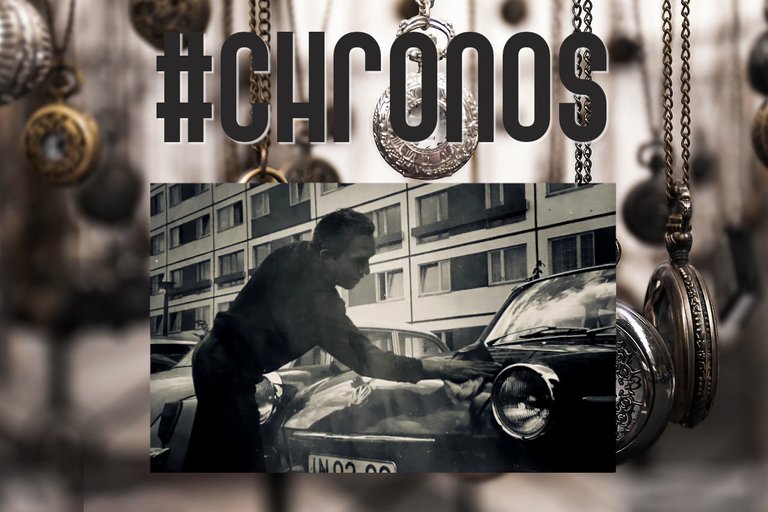
Cuando llegamos a Berlín, en 1969, mi papá sabía que era una estadía para un largo tiempo.
Para moverse por los distintos rincones de la ciudad disponías de cantidad de transportes públicos que eran una novedad para nosotros, el tranvía, el trolebús, el autobús clásico y además contaba con un tren subterráneo (U-Bahn) y otro superficial (S-Bahn). Sin embargo, seguramente ya con una idea clara de los planes para el futuro, mi papá decidió comprar un carro. En Caracas, antes de irnos teníamos uno y en el viajábamos por el país y a cuanto paseo inventaban mis padres, quienes a falta de planes mejores, nos llevaban a pasear por la ciudad de noche para ver las luces de las plazas, las avenidas, las tiendas y a comer a uno que otro restaurante, preferiblemente tipo campestre.
En esos tiempos, para comprar un carro en Alemania Oriental, había que anotarse en un lista de espera y aunque mi papá, como corresponsal de prensa extranjero, contaba con una cantidad de prerrogativas, no podía saltarse esa regla. Pero entre los beneficios que disfrutaba, tenía una recomendación de frontera que le permitía pasar con grandes facilidades a Berlín occidental y de vuelta.
Así un día tomó el S-Bahn que lo llevó a Friedrichstraße, donde quedaba el famoso Check Point Charlie, paso de frontera de un Berlín al otro, y al final de la tarde regresó con una sorpresa para todos nosotros, un Volkswagen 1600 azul, que prometía grandes aventuras para esta familia venezolana.
Con sus documentos de compra hizo mi padre los trámites legales y nos asignaron la placa IN 03-03, correspondiente al registro de la República Democrática Alemana.
Mi padre siempre fue muy cuidadoso con los carros y así de manera regular lo lavaba, le hacía su encerado, los cambios de aceite y todo lo que garantizara su óptimo estado.
Ese VW se convirtió, de alguna manera, en una marca de la familia, ya que en del lado oriental de Berlín podías ver vehículos occidentales, incluyendo Volkswagen, pero no con las placas de la RDA, por lo cual ya resultaba algo extraño.
Berlín nos enamoró desde nuestra llegada a ese país, sin embargo pronto descubrimos que había un aspecto que no era nada divertido.
Durante una semanas que nos pasamos en Londres, antes de seguir viaje a Berlín, estuvimos en casa de unos amigos de teatro de mis padres. De sus hijos aprendimos una “ley” infantil: uno adquiría el derecho primario sobre cualquier objeto que uno se reservara con la simple invocación de una referencia a algo malo o desagradable a criterio de uno. Por ejemplo, si yo decía “sopa el televisor”, quedaba establecido que yo tendría derecho a escoger la programación en la próxima oportunidad. Si alguno decía “corriente el puesto delantero del carro”, ya era ley que en el próximo viaje este tendría derecho de ir junto al conductor (Si no iba algún adulto claro está).
Una vez en Berlín, mi hermana y yo seguimos aplicando esa “ley” y se convirtió en un estándar usar la palabra “picante”, pronto le agregamos la famosa sopa “Gulash”, a la cual pronto le siguió limón y la última que le agregamos fue la más larga de todas, con la cual si quería reservar el sillón grande para sentarte al llegar a casa, debías decir: “picante, Gulasch, limón y pasear por Berlín de noche en carro… el sillón”. Pues habíamos descubierto que los encantos de la ciudad desaparecían al caer el sol, convirtiéndose en una ciudad gris, sin neones, sin bullicios. Era 1970.
Pero esos paseos se veían contrarrestados con los maravillosos viajes que realizamos por todo el país y por gran parte del continente europeo, que bien se merecen sus propias historias cada uno. Aquel VW 1600 se convirtió en causa y parte de infinidad de aventuras, entre las que destaca el viaje de seis personas en él, con una carpa tipo familiar e infinidad de enseres para pasar un mes en carretera, viajando de camping en camping, montando la carpa cada noche y desmontando al día siguiente para seguir viaje, y así bajar por los lados se Sajonia, cruzar la frontera a Chequia, pasar a Alemania occidental, bajar a Suiza para desde allí cruzar los Alpes y tras pasar la bella ciudad de Lugano, entrarle a Italia por Milano y llegar hasta Roma para luego regresar, pero esta vez subiendo por Austria para subir por Salzburgo.
Ese mismo carro fue el acompañante en numerosas de nuestras primeras actuaciones musicales, especialmente de mi hermana Hely (@helyorsini), quien me llevaba una gigantesca ventaja en ese terreno, y estuvo en nuestro día a día.
Cuatro años después de la llegada de aquel sedán azul a nuestras vidas, le llegó a mi papá la propuesta de un traslado a Moscú para ser corresponsal desde la Unión Soviética. Él aceptó y preparamos la mudanza, la cual no incluía el carro.
Allí fue que descubrimos un pequeño error. El vehículo era de occidente, es decir de la República Federal Alemana, mientras que la matrícula era de la República Democrática Alemana. Por ser un carro de occidente, no se podía vender en la RDA, y por tener placas de este país, no se podía vender en occidente. No solo no se podía vender, sino que por la misma situación, no se podía hacer ningún traspaso ni nada por el estilo.
Finalmente, cuando se agotó el tiempo, mi papá volvió a cruzar una vez más Check Point Charlie, condujo nuestro sedán hasta un callejón de Berlín occidental, lo estacionó, se despidió de él y regresó caminando al puesto de frontera, a nuestra casa y a nuestro nuevo destino a más de 1800 kilómetros más al oriente de la ciudad de la Puerta de Brandenburgo, del Reichstag, de la Alexanderplatz y su Torre de Televisión y de tantos recuerdos en nuestras vidas.
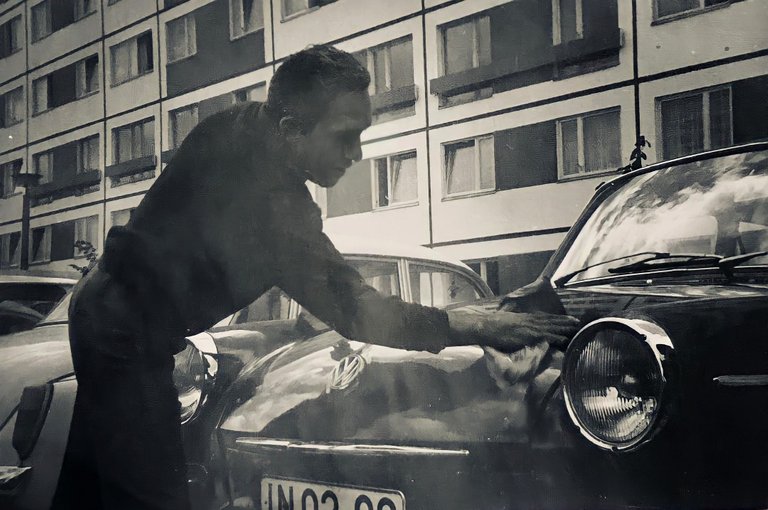
Mi papá puliendo el carro
My dad polishing the car

English version
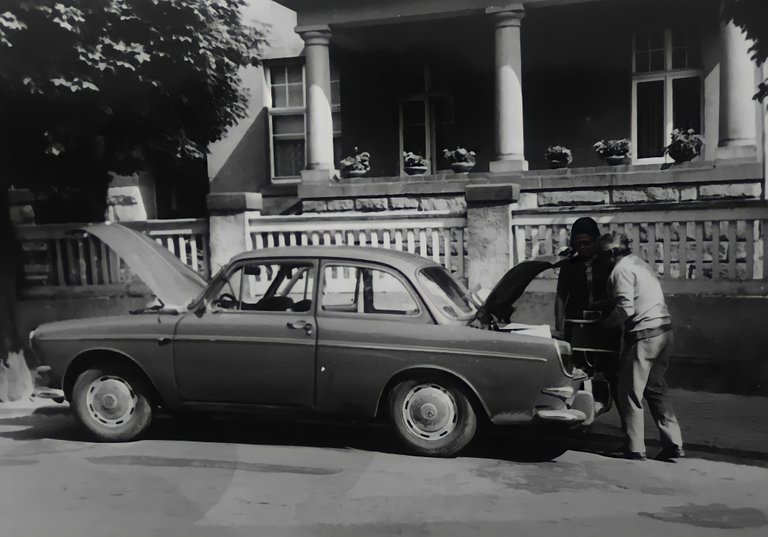
Mis padres cargando el equipaje
My parents carrying the luggage
When we arrived in Berlin in 1969, my dad knew that we were staying for a long time.
To move around the different corners of the city you had a lot of public transportation that was a novelty for us, the streetcar, the trolleybus, the classic bus and also had a subway train (U-Bahn) and a surface train (S-Bahn). However, surely with a clear idea of the plans for the future, my dad decided to buy a car. In Caracas, before we left, we had one and in it we traveled around the country and went on every trip my parents invented, who, for lack of better plans, took us for a walk around the city at night to see the lights of the squares, the avenues, the stores and to eat at one or another restaurant, preferably a country-style restaurant.
In those days, to buy a car in East Germany, you had to get on a waiting list and although my dad, as a foreign press correspondent, had a number of prerogatives, he couldn't get around that rule. But among the benefits he enjoyed, he had a border recommendation that allowed him to pass with great ease to West Berlin and back.
So one day he took the S-Bahn that took him to Friedrichstraße, where the famous Check Point Charlie was located, the border crossing from one Berlin to the other, and at the end of the afternoon he returned with a surprise for all of us, a blue Volkswagen 1600, which promised great adventures for this Venezuelan family.
With his purchase documents, my father did the legal paperwork and we were assigned the license plate IN 03-03, corresponding to the registration of the German Democratic Republic.
My father was always very careful with the cars and so he regularly washed it, waxed it, changed the oil and did everything that guaranteed its optimum condition.
That VW became, in a way, a family brand, since on the eastern side of Berlin you could see western vehicles, including Volkswagens, but not with GDR license plates, so it was already something strange.
We fell in love with Berlin from the moment we arrived in the country, however we soon discovered that there was one aspect that was no fun at all.
During the weeks we spent in London, before continuing our trip to Berlin, we stayed at the home of some theater friends of my parents. From their children we learned a childish "law": one acquired the primary right to any object one reserved for oneself by simply invoking a reference to something bad or unpleasant in one's judgment. For example, if I said "soup the TV," it was established that I would have the right to choose the programming at the next opportunity. If someone said " stream the front seat of the car", it was already a law that on the next trip they would have the right to ride next to the driver (if there was no adult in the car of course).
Once in Berlin, my sister and I continued to apply this "law" and it became standard to use the word "spicy", soon we added the famous "Goulash" soup, which was soon followed by lemon and the last one we added was the longest of all, with which if you wanted to reserve the big armchair to sit on when you got home, you had to say: "spicy, goulash, lemon and a ride through Berlin at night in the car... the armchair". For we had discovered that the city's charms disappeared when the sun went down, turning it into a gray city, no neon, no hustle and bustle. It was 1970.
But those rides were counterbalanced by the wonderful trips we made throughout the country and much of the European continent, which well deserve their own stories each. That VW 1600 became the cause and part of countless adventures, including the trip of six people in it, with a family-type tent and countless belongings to spend a month on the road, traveling from camping to camping, setting up the tent every night and dismantling it the next day to continue traveling, and so down the sides of Saxony, crossing the border to the Czech Republic, passing through western Germany, down to Switzerland and from there crossing the Alps and after passing the beautiful city of Lugano, entering Italy through Milan and arriving in Rome and then returning, but this time going up through Austria to go up through Salzburg.
That same car was the companion in many of our first musical performances, especially for my sister Hely (@helyorsini), who had a gigantic advantage over me in that field, and was in our day-to-day life.
Four years after the arrival of that blue sedan to our lives, my dad was offered a transfer to Moscow to be a correspondent from the Soviet Union. He accepted and we prepared the move, which did not include the car.
It was there that we discovered a small mistake. The car was from the West, i.e. the Federal Republic of Germany, while the license plate was from the German Democratic Republic. Because it was a western car, it could not be sold in the GDR, and because it had GDR plates, it could not be sold in the West. Not only could it not be sold, but because of the same situation, it could not be transferred or anything like that.
Finally, when time ran out, my dad crossed Check Point Charlie one more time, drove our sedan to an alley in West Berlin, parked it, said goodbye to it, and walked back to the border post, to our house, and to our new destination more than 1800 kilometers further east of the city of the Brandenburg Gate, the Reichstag, the Alexanderplatz, and its TV Tower and so many memories in our lives.
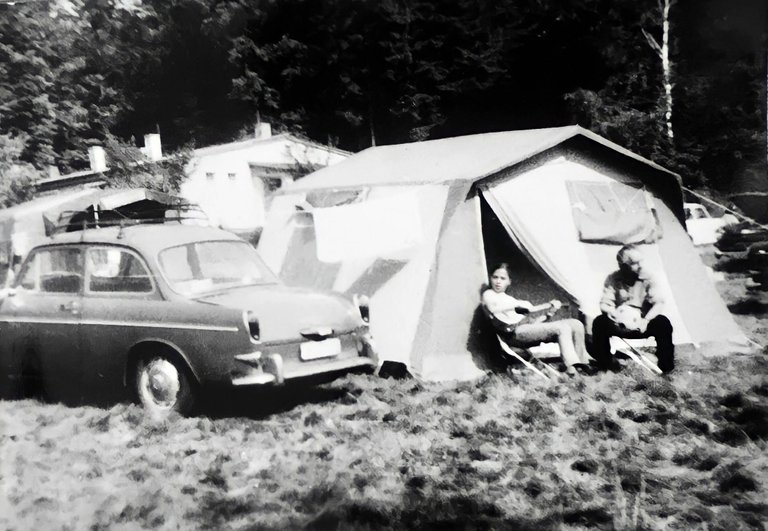
Mi hermana con el cuatro venezolano, mi papá, la carpa y el carro
My sister with the Venezuelan cuatro, my dad, the tent and the car
Fuente de las imágenes || Image sources [1]
Las demás son de nuestro álbum familiar || The others are from our family album

Este texto pertenece a mi serie #Chronos. Puedes leer más sobre la misma en Mis crónicas literarias. Si es de tu agrado este estilo y quieres sumarte a la creación de crónicas literarias, te invito a usar la etiqueta #chronos para la misma.
This writing is part of my series #Chronos. You can read more about it on My literary chronicles. If you like this style and want to join the creation of literary chronicles, I invite you to use the hashtag #chronos for it.

Descarga el poemario de @Ylich"De la vida, la pasión y de la muerte"¡Haz clic aquí! | 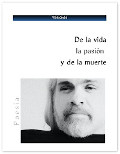 |
|---|

If you don't have an account at Hive yet, I invite you to read my post My Hive Testimony || Mi testimonio Hive
Si aún no tienes cuenta en Hive te invito a leer mi publicación My Hive Testimony || Mi testimonio Hive

Excelente!!!!!! contenido de calidad e historia envolvente!! Un abrazo!!
¡Muchísimas gracias!
The rewards earned on this comment will go directly to the person sharing the post on Twitter as long as they are registered with @poshtoken. Sign up at https://hiveposh.com.
Fantástica crónica... Pero, carajo... Casi que lloro cuando leí que tuvieron que dejar el carrito en una calle de Berlín Occidental, conchale... :(
Jajaja, si eso te pasó a ti, te imaginas cómo quedamos nosotros... Bueno tanto así, que casi 50 después escribí esta crónica 😀
¡Vaya crónica! Me gustó mucho, no tenía el dato de que era posible "importar" autos de la RFA a la RDA. Me interesa mucho la historia de esa época y sobre todo de la guerra fría. Gracias por este viaje @ylich.
Por cierto una pregunta personal: ¿eres amante de la radio o pasas de eso? Por aquí un amante de la onda corta, saludos.
Jajaja, es que creo que ese caso sentó un precedente. Para mí el punto está en que no se podían importar, pero no no se dieron cuenta o pasó por debajo de la mesa. Por eso es que después no encontraba solución.
En cuanto a la radio, ese era uno de mis sueños de chamo, tener un buen radio de largo alcance y meterme en eso a fondo, pero nunca lo hice... 😞
Ah qué lástima, pero nunca es tarde. Yo también soñaba con un receptor que tuviera buena potencia pero ahora con poco dinero uno puede encontrar muy buenos como los Tecsun y XHDATA y todavía hay mucho que escuchar en la radio.
!LUV
@el-panal(1/1) gave you LUV. H-E tools | connect | <><
H-E tools | connect | <><
Tap to help.
Uffff, leo la historia con un nudo en la garganta reviviendo cada paso que nombras.
Está hermoso, muuuuchas felicidades! 👏 👏 👏 👏 👏 😍
¡Pues sí, son de esas cosas que dejaron profunda huella en cada uno de nosotros!
!LUV
@ylich(3/10) gave you LUV. H-E tools | connect | <><
H-E tools | connect | <><
Feliz, feliz, feliz y muy productivo día. Los recuerdos familiares son una joya de incalculable valor. Felicitaciones por tus fabulosos recuerdos.
¡Así es! 😉
Me enamoré de esta crónica, la verdad es que me sumergí tanto en el relato que casi me sentí parte de él, sobre todo por el hecho de que me gusta Alemania y me atrae su polémica historia, es fascinante la historia del carro y al mismo tiempo me parece triste su final, pero era algo muy común en esa época, de hecho, si no no estoy equivocada, creo que existía un lugar específico, destinado para dejar los autos que debían ser abandonados por las razones que ya expusiste en tu relato, no sé si fue allí donde tu papá dejó el tuyo.